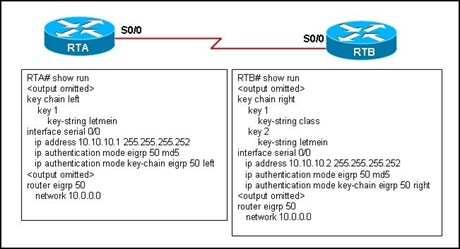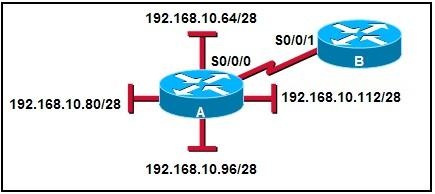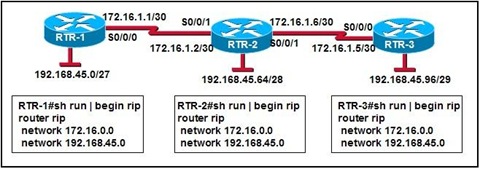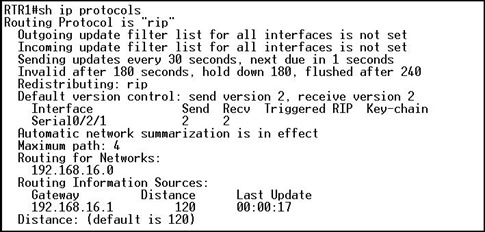4.0 CCNA 3: Introducing Routing and Switching in the Enterprise:Module 5
1. What three statements are true about routers that are configured for EIGRP? (Choose three.)
• They can support multiple routed protocols
• They can support only link-state protocols.
• They send their entire routing tables to neighboring routers.
• They send partial routing updates in response to topology changes.
• They send routing updates to all other routers in the network.
• They use hello packets to inform neighboring routers of their status.
2. Given the following commands:
Router(config)# router rip
Router(config-router)# network 192.31.7.0
What three conclusions can be determined based on the commands used on the router? (Choose three.)
• A link-state routing protocol is used.
• A distance vector routing protocol is used.
• Routing updates broadcast every 30 seconds.
• Routing updates broadcast every 90 seconds.
• Hop count is the only metric used for route selection.
• Bandwidth, load, delay, and reliability are metrics used for route selection.
3. What is indicated when an EIGRP route is in the passive state?
• The route has the highest path cost of all routes to that destination network.
• The route must be confirmed by neighboring routers before it is put in the active state.
• The route is a feasible successor and will be used if the active route fails.
• There is no activity on the route to that network.
• The route is viable and can be used to forward traffic.
4. What two problems may occur if the EIGRP default bandwidth for a serial link is higher than the actual bandwidth? (Choose two.)
• Routing updates will arrive too quickly for receiving routers to process.
• The port IP address will be rejected by the routing protocol.
• Suboptimal paths will be selected.
• The port protocol will return to the HDLC default.
• VLSM support will be disabled.
• Network convergence may be affected.
5. What is the default administrative distance for EIGRP internal routes?
• 70
• 90
• 100
• 110
• 120
• 255
6. A network administrator issues the command show ip route and sees this line of output:
192.168.3.0/24 [120/2] via 192.168.2.2, 00:00:05, Serial0/0
What two pieces of information can be obtained from the output? (Choose two.)
• RIP is the routing protocol configured.
• This is a static route to network 192.168.3.0.
• The metric for this route is 2.
• The next periodic update is in 5 seconds.
• The autonomous system number is 120.
7.
Refer to the exhibit. Which statement is true about the EIGRP authentication configuration?
• RTA and RTB will accept updates from each other.
• RTA and RTB will not accept updates from each other because key 1 on RTB does not match RTA.
• RTA and RTB will not accept updates from each other because the key chain names do not match.
• The ip authentication mode AS does not match the locally configured AS.
8. Which Layer 4 protocol does EIGRP use to provide reliability for the transmission of routing information?
• DUAL
• IP
• PDM
• RTP
• TCP
• UDP
9.
Refer to the exhibit. Routers RTR-1 and RTR-3 are completely configured. The administrator needs to configure the routing protocol on router RTR-2 so that communication occurs throughout the network. Which group of commands will successfully configure EIGRP on RTR-2?
• RTR-2(config)# router eigrp 1
RTR-2(config-router)# network 198.18.76.0
• RTR-2(config)# router eigrp 1
RTR-2(config-router)# network 198.18.76.0 0.0.0.3 no-summary
RTR-2(config-router)# network 198.18.76.4 0.0.0.3 no-summary
RTR-2(config-router)# network 198.18.76.128 0.0.0.192 no-summary
• RTR-2(config)# router eigrp 1
RTR-2(config-router)# network 198.18.76.0 0.0.0.3 area 0
RTR-2(config-router)# network 198.18.76.4 0.0.0.3 area 0
RTR-2(config-router)# network 198.18.76.192 0.0.0.192 area 0
• RTR-2(config)# router eigrp 1
RTR-2(config-router)# network 198.18.76.0 0.0.0.3
RTR-2(config-router)# network 198.198.76.4 0.0.0.3
RTR-2(config-router)# network 198.198.76.128 0.0.0.192
10. What prevents RIPv1 updates from being correctly advertised?
• an increase in network load
• the use of variable length subnet masks
• the use of multiple Layer 3 networks on the same router
• a variation in connection speeds on the links to a destination
• a mismatch between the configured bandwidth and the actual bandwidth of a link
11. What does a router that is running RIP use to determine the best path to take when forwarding data?
• the host portion of the network address
• the speed of network convergence
• the calculated metric for the destination network
• the number of broadcasts occurring on an interface
• the number of errors occurring on an interface
12. What is the purpose of the network command when RIP is being configured as the routing protocol?
• It identifies the networks connected to the neighboring router.
• It restricts networks from being used for static routes.
• It identifies all of the destination networks that the router is allowed to install in its routing table.
• It identifies the directly connected networks that will be included in the RIP routing updates.
13. How do EIGRP routers establish and maintain neighbor relationships?
• by exchanging neighbor tables with directly attached routers
• by comparing known routes to information received in updates
• by exchanging hello packets with neighboring routers
• by dynamically learning new routes from neighbors
• by exchanging routing tables with directly attached routers
14.
Refer to the exhibit. Routers A and B have EIGRP configured and automatic summarization has been disabled on both routers. Which router command will summarize the attached routes?
• ip area-range eigrp 1 192.168.10.80 255.255.255.224
• ip summary-address eigrp 1 192.168.10.64 255.255.255.192
• ip summary-address 192.168.10.80 0.0.0.31
• ip summary-address eigrp 1 192.168.10.64 0.0.0.63
• ip area-range eigrp 1 192.168.10.64 255.255.255.224
15. How often does RIPv2 send routing table updates, by default?
• every 30 seconds
• every 45 seconds
• every 60 seconds
• every 90 seconds
16.
Refer to the exhibit. A network administrator is troubleshooting a routing problem. When the show ip route command is entered on RTR-1, only the serial link between RTR-2 and RTR-3 has been learned from the RIP routing protocol. What are two issues? (Choose two.)
• RIPv1 is a classful routing protocol.
• RIPv1 does not support subnetting.
• The Ethernet networks on RTR-2 and RTR-3 were not entered correctly in the network statements on these routers.
• RIPv1 does not support VLSM.
• RIPv1 is a classless routing protocol.
17. What two statements are correct regarding EIGRP authentication? (Choose two.)
• EIGRP authentication uses the MD5 algorithm.
• EIGRP authentication uses a pre-shared key.
• EIGRP authentication requires that both routers have the same key chain name.
• EIGRP authentication uses varying levels of WEP to encrypt data exchanged between routers.
• EIGRP authentication can be configured on one router and updates from this router are protected; whereas a neighbor router can be without the authentication configuration and its updates are unprotected.
18. When should EIGRP automatic summarization be turned off?
• when a router has not discovered a neighbor within three minutes
• when a router has more than three active interfaces
• when a network contains discontiguous network addresses
• when a router has less than five active interfaces
• when a network addressing scheme uses VLSM
19. What is the maximum number of hops that RIP will attempt before it considers the destination unreachable?
• 14 hops
• 15 hops
• 16 hops
• 17 hops
20. What two statements are true regarding EIGRP tables? (Choose two.)
• A feasible successor route can be found in the topology table.
• A successor route can only be found in the routing table.
• The topology table shows whether a route is in the passive or active state.
• The routing table shows the amount of time elapsed since a router adjacency was formed.
• The neighbor table shows all adjacent Cisco devices.
• Administrative distance is shown as a column in the neighbor table.
21.
Refer to the exhibit. Which statement is true about the output from the show ip protocols command?
• RIPv2 is configured on this router.
• Auto summarization has been disabled.
• The next routing update is due in 17 seconds.
• 192.168.16.1 is the address configured on the local router








0 comments:
Post a Comment